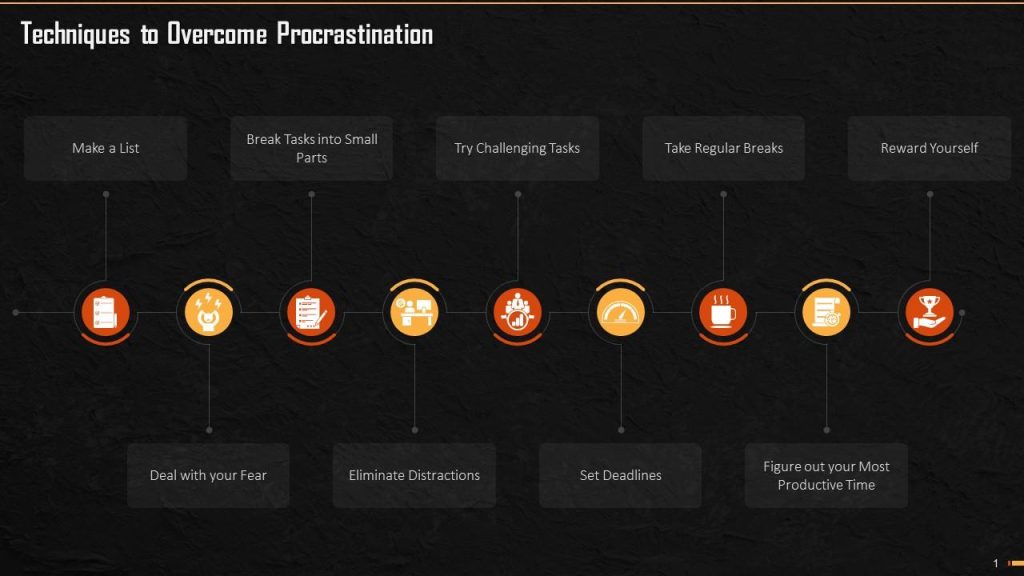Conquer Procrastination Achieve Goals with Small Steps Easily

Unlock Your Potential
Feeling overwhelmed by your goals? Many people struggle with procrastination, a common hurdle that impacts productivity and personal satisfaction. This article will guide you through conquering procrastination and achieving your dreams through manageable steps.
Why Procrastination Happens
Procrastination can stem from various factors, including:
- Fear of failure: This often occurs when individuals feel the weight of expectations, either from themselves or others. This fear can paralyze decision-making processes and lead to avoidance instead of engagement.
- Lack of motivation: When tasks seem dull or uninteresting, motivation can dip dramatically. You may find yourself delaying work on assignments that simply don’t inspire you.
- Overwhelm: Juggling too many responsibilities at once can lead to feelings of being overwhelmed. The sheer volume of tasks can cause a mental shutdown, making it difficult to initiate even one project.
Understanding these underlying issues is crucial for breaking the cycle of procrastination. Instead of getting bogged down by the enormity of your goals, it’s essential to focus on small, actionable steps.
The Power of Small Steps
Implementing tiny changes can lead to a remarkable transformation in both your mindset and your productivity. Consider starting with:
- Setting daily goals: Aiming for just 1-2 achievable tasks each day can foster a sense of accomplishment. For example, if you are working on a large project, break it down into smaller sections—such as conducting research or drafting an outline—so that you can see tangible progress.
- Creating a schedule: Allocating specific time slots for focused work can help establish a routine. Many successful individuals, from authors to entrepreneurs, swear by dedicated time blocks, allowing them to channel their energies and minimize distractions effectively.
- Eliminating distractions: Identify anything that pulls your attention away, such as social media or unnecessary notifications. Tools like website blockers during work hours can help you stay focused on the task at hand.
By embracing these small modifications, you can develop a habit of consistency that paves the way for long-term success. The journey to overcoming procrastination is not an easy one, but with patience and persistence, you can change your approach to tasks and unleash your productivity.

Delve deeper into this article to learn how to effectively harness the method of incremental change! The insights gained from understanding and addressing procrastination not only enhance your productivity but also enrich your overall personal satisfaction.
CHECK OUT: Click here to explore more
Breaking Down Barriers
Conquering procrastination requires more than just willpower; it demands a strategic approach that focuses on dismantling the barriers that hold you back. By recognizing your specific triggers and implementing effective strategies, you can transform your productivity and set yourself on a path toward achieving your goals.
Identifying Your Procrastination Triggers
The journey toward overcoming procrastination starts with self-awareness. Identifying what prompts you to delay tasks is essential for creating a tailored plan of action. Common triggers include:
- Perfectionism: Holding yourself to impossibly high standards can lead to paralyzing fear when starting tasks. Understanding that imperfection is part of the learning process can ease this pressure.
- Decision Fatigue: When faced with too many choices, it can become overwhelming, leading to avoidance. Narrowing down options and setting clear priorities can alleviate this mental strain.
- Time Mismanagement: Underestimating how long tasks will take can cause stress and procrastination. Use tools such as timers or planners to gain a better understanding of your time requirements.
Once you recognize your specific procrastination triggers, you can develop targeted strategies to counteract them. This approach allows you to focus on tackling one obstacle at a time rather than feeling defeated by the entirety of your goals.
Implementing Incremental Changes
The key to success lies in embracing incremental changes. Small steps can lead to significant outcomes over time. Consider these tactics to facilitate the process:
- Start with the “Two-Minute Rule”: If a task can be completed in two minutes or less, do it immediately. This simple rule can help eliminate mental clutter and free up time for larger projects.
- Utilize the Pomodoro Technique: Work in focused bursts—typically 25 minutes followed by a short break. This method can help maintain concentration and prevent burnout.
- Visualize Your Progress: Create a visual representation of your tasks and achievements. Whether it’s a checklist or a progress chart, seeing how far you’ve come can boost motivation and reinforce your commitment.
These incremental changes not only help in achieving immediate tasks but also teach you how to build momentum for more extensive goals. By committing to these small actions, you create a sense of progress that fuels further engagement with your projects.
As you dive deeper into this process of self-discovery and implementation, you’ll find that conquering procrastination is not about radical transformation overnight. Instead, it’s about creating a sustainable framework to approach your goals with confidence, aiming to make your journey more enjoyable and less daunting.
| Advantages | Details |
|---|---|
| Incremental Progress | Achieving goals through small steps ensures that even the longest tasks are manageable, reducing fear and overwhelm. |
| Increased Motivation | Celebrating small victories boosts confidence, fostering a positive feedback loop that propels further action. |
| Flexibility and Adaptation | Small, manageable steps provide room to adapt to changing circumstances, making it easier to stay on track. |
| Reduced Stress | By breaking tasks down, stress is minimized, allowing for a clearer mindset and enhanced focus on priorities. |
In today’s fast-paced world, the phrase “Conquer Procrastination” resonates deeply as many individuals struggle with the challenges of staying on task. The method of achieving goals with small steps not only fosters a structured approach but also diminishes feelings of anxiety and provides the motivation needed to continue pushing forward. Notably, this strategy promotes a natural path to success in both personal and professional realms. By understanding the core advantages delineated in this table, readers can appreciate how embracing a gradual approach can lead to monumental achievements and lasting fulfillment. It’s time to take that first step—one small action at a time!
SEE ALSO: Click here to read another article
Building Momentum Toward Success
Once you’ve begun to identify triggers and implement incremental changes, the next phase is to focus on building momentum. Many individuals underestimate how gradually accumulating small victories can radically transform their approach to work and life goals. With each completed task, confidence grows, and the fear of starting future tasks diminishes.
The Role of Accountability
Engaging with accountability partners or joining support groups can make a significant difference in your journey. The principle here is simple: sharing your goals with others increases your commitment. Consider the impact of declaring your intentions publicly, whether to a friend, family member, or social media platform. This accountability can motivate you to follow through, as you become less inclined to let others down.
- Group Challenges: Participate in small challenges with peers or colleagues. Friendly contests, like who can accomplish the most tasks in a week, can add an element of fun while leading to progress.
- Feedback Loops: Seek constructive feedback regularly. Having an external perspective can boost your motivation and provide valuable insights into areas of improvement.
Establishing Routine Through Habits
Integrating new habits into your routine can cement small steps into your daily life and help you maintain consistent progress. Studies suggest that it takes approximately 21 days to form a new habit. Therefore, by consciously dedicating yourself to these adjustments for three weeks, you may find that they become second nature. Consider utilizing tools like habit tracking apps or journals to monitor your daily activities, reinforcing the desired behavior.
- Morning Rituals: Begin each day with a short morning routine that sets a productive tone. This might include a quick workout, meditation, or writing out your main goals for the day.
- Time Blocking: Allocate specific time frames for different tasks throughout your day. Treat these blocks as you would important appointments to ensure dedicated focus on your work.
Embracing Failure and Learning
Understanding that procrastination sometimes stems from a fear of failure is crucial. Shifting your mindset to view failure as an opportunity for growth can liberate you from the paralysis that often accompanies perfectionism. Embrace the notion that mistakes are part of the process. Using them as learning experiences can turn setbacks into stepping stones.
For instance, if you miss a deadline or find yourself overwhelmed, take a moment to analyze what went wrong. Was it due to unrealistic expectations? Were there external factors at play? By dissecting these events, you not only identify improvements but also desensitize yourself to the fear of attempting again.
By focusing on building momentum, establishing accountability, and embracing routine and failure, you create a robust framework that discourages procrastination. These strategies help foster a success-oriented mindset that steadily propels you toward your goals, allowing you to conquer procrastination in a deliberate and effective manner.
CHECK OUT: Click here to explore more
Conclusion: A Pathway to Progress
In a world bustling with distractions and high expectations, conquering procrastination and achieving your goals may seem daunting. However, the journey toward your aspirations doesn’t have to be overwhelming. By adopting the philosophy of taking small steps, you carve out a more manageable and attainable path. Each minor victory, whether it be crafting a morning routine or sharing your goals with an accountability partner, becomes a crucial building block in your success.
It is essential to remember that persistence, not perfection, is key to growth. The concept of embracing failure as a learning experience allows you to enhance your resilience and adaptability in the face of obstacles. As you break down your larger objectives into achievable tasks, the cumulative effect not only reduces the pressure but also elevates your confidence, enabling you to push past barriers that once felt insurmountable.
Moreover, fostering a supportive network through accountability can amplify your motivation and drive. The more you engage with others, the higher the chances of moving forward, transforming your goals into a collective journey. As you immerse yourself in habit-forming practices that support your intentions, consistency becomes your ally.
So, take a moment to reflect on your aspirations. What small action can you commit to today? Remember, the road to success is paved with tiny strides, and every step counts. As you embark on this transformative journey, with each task completed, you edge closer to not just conquering procrastination but sculpting a future defined by accomplishment and fulfillment.



